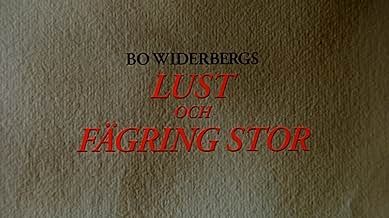A Malmö en Suède pendant la Seconde Guerre mondiale, Stig est un élève de 15 ans et Viola, son professeur, a 37 ans. Tous deux attirés par ce qui les opposent, ils entament une relation pass... Tout lireA Malmö en Suède pendant la Seconde Guerre mondiale, Stig est un élève de 15 ans et Viola, son professeur, a 37 ans. Tous deux attirés par ce qui les opposent, ils entament une relation passionnée et interdite.A Malmö en Suède pendant la Seconde Guerre mondiale, Stig est un élève de 15 ans et Viola, son professeur, a 37 ans. Tous deux attirés par ce qui les opposent, ils entament une relation passionnée et interdite.
- Réalisation
- Scénario
- Casting principal
- Nommé pour 1 Oscar
- 6 victoires et 7 nominations au total
Avis à la une
Rape is rape. The "love scenes" are rape. Imagine if the genders were reversed or both the teacher an the child were male, you would see it clearly as rape. Teachers have authority and power over children and just like in the US -- in Sweden it is legally rape for a teacher in a school to have sex with a minor child who attends that school. There is no age under 18 where a minor may consent with a teacher
Again if the genders were reversed in this and it were some 35 or 40 year old guy teacher and his 15-year-old girl student would we be saying, as some reviewers here are, that the "love scenes were "tender" and "beautiful." WTF?
Again if the genders were reversed in this and it were some 35 or 40 year old guy teacher and his 15-year-old girl student would we be saying, as some reviewers here are, that the "love scenes were "tender" and "beautiful." WTF?
This is the life most men wish they had - an affair with their teacher. But all were not so pretty as the one in here. It's a coming of age story set in a time when men were going off to die in wars and those left behind were trying to make sense of it all in a society that was slowly crumbling. More complicated than now but still relevant in today's youth. All handled brilliantly by the Swedish director, Bo Widerberg, who loves to tell his tales in sensual lighting and locations. He sometimes tends to go soapy but held it in line for hi last work of art. Hewas to pass away a couple of years later. But he left us with another tender story for the soul.
I caught this film on Canadian television, and I was startled by the risque content being broadcast on a non-pay station. This is a story of a growing adolescent boy in a war-torn Europe. The focus of the movie is in the complex relationships he holds with the people in his life. The controversial nature may deter the more conservative American; however, the characters are well-rounded and acted and the cinematography is superb. I have a feeling this director may be famous in his home country, there is a touch of epic brilliance in the movement of the scenes.
This was to be director Widerberg's last movie. A sweet family farewell, since his son played the lead in it. What his last words may be, as expressed in this movie, though, is hard to say. There is no clear moral in it, for which I am thankful, but a somewhat distressing observation about love: it is a close neighbor to hate, and it will not leave without vengeance.
The love affair between the school teacher and the teenage student is interesting when it starts to break up, but its beginning is too swiftly dealt with to make any sense, and its joyous, lustful phase is without depth. Only when things go awry, does the story get interesting, and the actors get to excel in their art.
The title is from a psalm, which is traditionally sung by students when they leave school for the summer break - or for good. It's a hymn to the summer and its luscious splendor - therefore, a lust of another kind, than the carnal one the movie deals with. Some Widerberg irony, no doubt.
Using his son as the student in the movie, was not that good an idea, although Johan Widerberg has a rare charisma on screen, and his own odd talent in acting. His father seems not to have been able to treat his son with the same merciless exploitation, as he was quite apt to do with other actors. So, the student is left hanging in a kind of vacuum, as if empty of his own intentions and conflicts. Things happen to him, as if he had nothing to do with them.
In this type of drama, it is important that the characters are stripped naked - well, mainly their souls, but bodies too, if need be. Widerberg manages the latter with his son, briefly, but not at all the former. When wanting to protect his son, he actually abandons him - for no other reason than the inhibitions in his own fatherhood. Johan, on the other hand, seems to be prepared to do any sacrifice necessary, to make the movie work.
I could be wrong. But the impression remains: the student's story never really gets to be told, because he is not allowed to be present, completely.
The love affair between the school teacher and the teenage student is interesting when it starts to break up, but its beginning is too swiftly dealt with to make any sense, and its joyous, lustful phase is without depth. Only when things go awry, does the story get interesting, and the actors get to excel in their art.
The title is from a psalm, which is traditionally sung by students when they leave school for the summer break - or for good. It's a hymn to the summer and its luscious splendor - therefore, a lust of another kind, than the carnal one the movie deals with. Some Widerberg irony, no doubt.
Using his son as the student in the movie, was not that good an idea, although Johan Widerberg has a rare charisma on screen, and his own odd talent in acting. His father seems not to have been able to treat his son with the same merciless exploitation, as he was quite apt to do with other actors. So, the student is left hanging in a kind of vacuum, as if empty of his own intentions and conflicts. Things happen to him, as if he had nothing to do with them.
In this type of drama, it is important that the characters are stripped naked - well, mainly their souls, but bodies too, if need be. Widerberg manages the latter with his son, briefly, but not at all the former. When wanting to protect his son, he actually abandons him - for no other reason than the inhibitions in his own fatherhood. Johan, on the other hand, seems to be prepared to do any sacrifice necessary, to make the movie work.
I could be wrong. But the impression remains: the student's story never really gets to be told, because he is not allowed to be present, completely.
Watching "All Things Fair" as it showed on TV here in Canada on CBC public network last night, was a treat. Only my sensible, nagging partner coaxing me to get to bed on a work night persuaded me we could trust the VCR to tape the last hour or so. Fortunately for his neck, the tape ran out during the closing credits and not before!
What I liked most about the film (with English subtitles) was the complexity of Sig's world and his relationships. It's a very real world feeling on screen, full of quirky believability, despite Sig's unusual arrangement with his teacher.
Though I know of a real life story resembling Sig's relationship with his teacher that went very differently for the teacher--ending in her virtual ruin--the behaviour of these film characters, the outcome and the aftermath, rings true nonetheless. No character is one-dimensional, even though the film schools us to sympathize with the choices of some and to repudiate others.
It's delightful to find in the credits that the director gave the plum lead role to his son. It takes an admirable trust, I think, to turn over a role like this to one's own young kin, complete with whatever there is in the script that MIGHT be autobiographical.
The female solo vocals in the soundtrack were wonderful. Now, I just need to found out who was singing like a bell whenever love or pain swelled in the story.
What I liked most about the film (with English subtitles) was the complexity of Sig's world and his relationships. It's a very real world feeling on screen, full of quirky believability, despite Sig's unusual arrangement with his teacher.
Though I know of a real life story resembling Sig's relationship with his teacher that went very differently for the teacher--ending in her virtual ruin--the behaviour of these film characters, the outcome and the aftermath, rings true nonetheless. No character is one-dimensional, even though the film schools us to sympathize with the choices of some and to repudiate others.
It's delightful to find in the credits that the director gave the plum lead role to his son. It takes an admirable trust, I think, to turn over a role like this to one's own young kin, complete with whatever there is in the script that MIGHT be autobiographical.
The female solo vocals in the soundtrack were wonderful. Now, I just need to found out who was singing like a bell whenever love or pain swelled in the story.
Le saviez-vous
- AnecdotesKarin Huldt was 14 during filming.
- GaffesRCA Red Seal records are shown playing on the phonograph nearly every time Stig and Kjell are listening to classical music, and when Stig is listening to a classical recording at his home; none of the pieces on the soundtrack were RCA recordings.
- ConnexionsFeatured in Lust och fägring - En film om Bo Widerbergs sista (2015)
- Bandes originalesRinaldo: Lascia ch'io pianga
Music by George Frideric Handel (as Händel)
Performed by Lesley Garrett with The Philharmonia Orchestra
Conducted by Ivor Bolton
Silva Screen Records (UK)
Meilleurs choix
Connectez-vous pour évaluer et suivre la liste de favoris afin de recevoir des recommandations personnalisées
- How long is All Things Fair?Alimenté par Alexa
Détails
- Date de sortie
- Pays d’origine
- Langues
- Aussi connu sous le nom de
- La belleza de las cosas
- Lieux de tournage
- Sociétés de production
- Voir plus de crédits d'entreprise sur IMDbPro
Box-office
- Budget
- 25 000 000 DKK (estimé)
- Montant brut aux États-Unis et au Canada
- 13 128 $US
- Week-end de sortie aux États-Unis et au Canada
- 4 530 $US
- 10 mars 1996
- Montant brut mondial
- 13 128 $US
Contribuer à cette page
Suggérer une modification ou ajouter du contenu manquant












